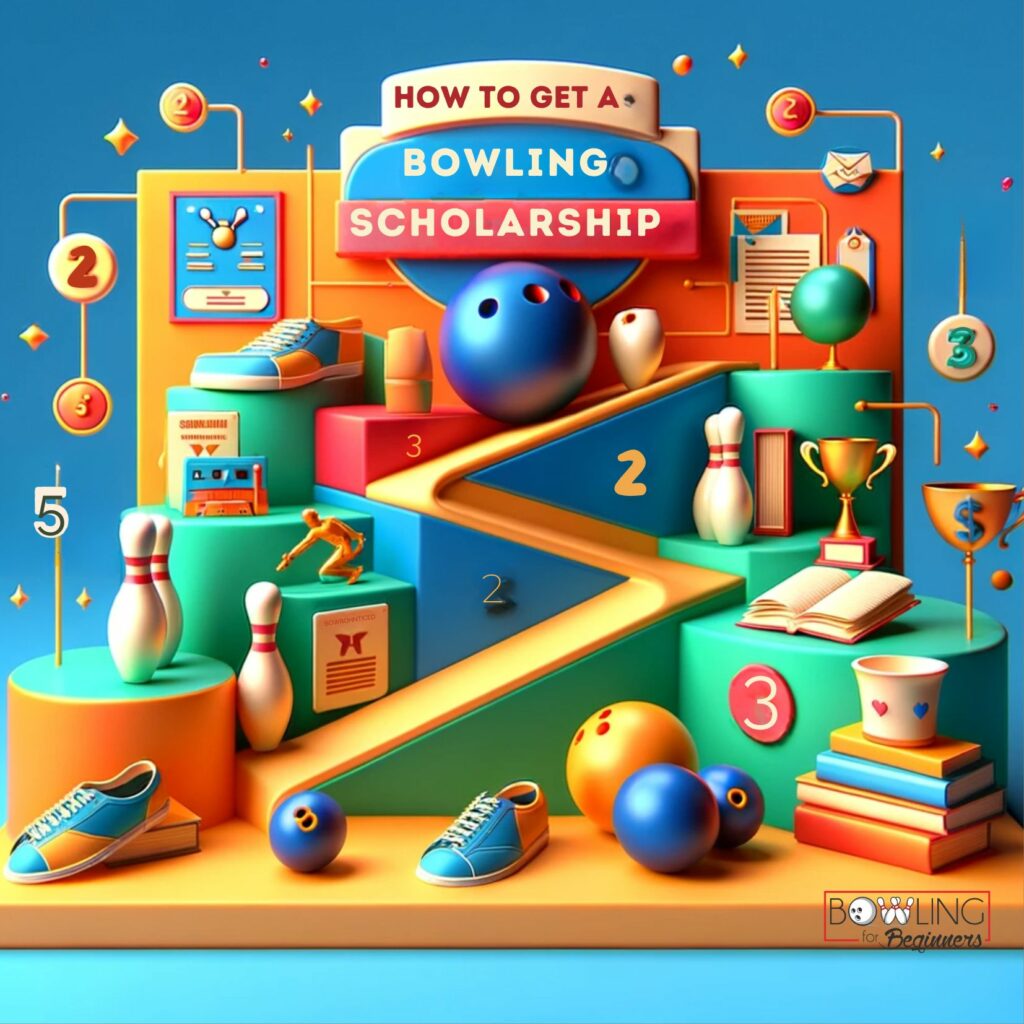
Bowling isn't just about late-night hangouts and funky shoes. Believe it or not, it's also a pathway to higher education for many talented student-athletes. Many colleges and universities offer bowling scholarships that can significantly lighten the financial burden of tuition.
Whether you've been knocking down pins since you were a toddler or have recently discovered you have a knack for the lanes, there's potential to turn that skill into some college cash.
In this article, we’ll cover the ins and outs of securing that highly-coveted bowling scholarship. Let’s get right into it!
Contents
- 1 How to Get a Bowling Scholarship
- 1.1 Key Takeaways
- 1.2 Step 1: Start Early
- 1.3 Step 2: Research Potential Colleges
- 1.4 Step 3: Hone Your Skills
- 1.5 Step 4: Track Your Achievements
- 1.6 Step 5: Network
- 1.7 Step 6: Focus on Academics
- 1.8 Step 7: Apply Broadly
- 1.9 Step 8: Stay Updated and Re-Evaluate
- 1.10 How Do You Get Recruited for College Bowling?
- 1.11 Is College Bowling a Scholarship Sport?
- 1.12 How Many D1 Bowling Teams Are There?
- 1.13 Can College Bowlers Bowl in a Money League?
- 1.14 Are Sports Scholarships Full?
- 1.15 Related Articles
How to Get a Bowling Scholarship
Bowling is more than a recreational activity; it's a legitimate pathway to securing financial assistance while achieving higher education. If you want to utilize your bowling talent to get a scholarship, follow this 8-step guide.
Key Takeaways
- Start bowling Early: Start bowling early to develop skills and gain experience. Getting an early start is crucial for scholarship applications.
- Research and Target Colleges: When researching colleges, look for solid bowling programs and scholarships. Two examples are Wichita State University and New Jersey City University.
- Develop Skills and Record Achievements: Regular practice is crucial for developing skills and achieving success. Joining leagues and participating in tournaments also help in skill development. Hiring a coach can further enhance skill development and record achievements: document scores, accolades, and game videos for applications.
- Build Relationships and Maintain Academics:
- Network with coaches and teams to build relationships.
- Send introductory emails with portfolios to maintain academics.
- Keep up with academic performance, as GPA matters for scholarships.
- Apply Broadly and Stay Updated:
- Apply to your preferred schools and stay updated on your progress.
- Submit applications to a variety of colleges and bowling organizations.
- Regularly check for new opportunities and deadlines and adjust strategies as needed.
Step 1: Start Early
Begin your bowling journey ASAP; the sooner you start bowling, the better. Not only does this give you more time to practice and perfect your game, but it also means you'll have more experience when it's time to apply.
Step 2: Research Potential Colleges
Identify bowling-friendly schools. Not all colleges or universities offer bowling as a collegiate sport, have college bowling scholarships, or offer school funded scholarships. Do your research to pinpoint institutions with strong bowling programs and scholarship offerings. Top bowling colleges include schools like Wichita State University, Jersey City University, and New Jersey City University.
Step 3: Hone Your Skills
Practice, Practice, Practice - this might seem obvious, but the better you are at the sport, the more likely you are to be awarded scholarships. Join a local league, hire a bowling coach, participate in tournaments, and practice regularly.
Step 4: Track Your Achievements
Start recording your scores, accolades, and even videos of your games. A well-organized portfolio can be invaluable when reaching out to college coaches or when applying for scholarships.
Step 5: Network
It’s crucial to build relationships with coaches and teams if you want a bowling scholarship. Reach out to college coaches with an introductory email, your portfolio, and a genuine interest in their program. Also, consider attending bowling camps or showcases where college scouts might be present.
Step 6: Focus on Academics
Remember, you're applying for college scholarships, so academic records do matter. Many athletic scholarships have a GPA requirement, and good grades can only strengthen your application.
Step 7: Apply Broadly
It’s always a good idea to diversify - don't put all your balls in one basket. Apply for scholarships at many institutions. Look for other scholarship opportunities outside of colleges, such as from bowling organizations (like the United States Bowling Congress) or local community groups.
Whenever you’re applying, be sure to read the application instructions carefully. Making a mistake on your application could cost you the scholarship. Keeping all of this in mind could help you earn substantial scholarship dollars.
Note: Some bowling organizations offer scholarship bowling opportunities for high school students as well as college students.
Step 8: Stay Updated and Re-Evaluate
Keep an eye on deadlines and opportunities. Bowling and college recruiting landscapes can change by the day. Regularly check for new scholarship opportunities, stay in touch with coaches, and be prepared to re-evaluate your college choices if needed.

How Do You Get Recruited for College Bowling?
Have good stats, create online profiles, attend camps, get athletic recommendations, and visit colleges.
There’s no set recipe for getting recruited for college bowling. But by following the steps outlined below, you can give yourself the best chance possible to be seen and chosen for a college bowling program:
Make Online Recruiting Profiles: Many athletes utilize websites like Smarthlete or Bowler Connections to get their name out there and network. By listing your information - achievements, community service, stats, and videos - you can increase visibility to college coaches across the nation.
Attend Bowling Camps: Many universities and private organizations hold bowling camps. Attending these can provide direct exposure to college coaches and give you an opportunity to showcase your skills.
Seek Recommendations: If you're part of a league or have a bowling coach, ask them for a letter of recommendation. References from bowling coaches and league personnel in the bowling community can boost your credibility by leaps and bounds.
Leverage Social Media: Create a dedicated athlete profile and brand on platforms like Instagram or Twitter. Share videos, achievements, and updates on your bowling journey. Tag colleges, coaches, and bowling organizations to increase visibility.
Visit Colleges: If you have specific colleges in mind, schedule visits. While there, express your interest in their bowling program and seek opportunities to meet with the team or coaching staff.
Is College Bowling a Scholarship Sport?
Yes, college bowling is a scholarship sport.
Collegiate bowling is an official NCAA sport for women and scholarships are offered. Many colleges and universities offer bowling scholarships for both men and women as part of their athletic programs.
Just know that there’s a disparity between the number of men’s and women’s bowling scholarships available. There tend to be more opportunities for Women’s bowling than men’s bowling.
Regardless, it’s important to apply for as many grants and awards as possible to improve your chances of receiving a scholarship. Also, research the colleges that offer bowling scholarships on their websites and contact them directly to ask about applying.
How Many D1 Bowling Teams Are There?
40- there are currently 40 Division 1 bowling teams among 12 Conferences in the NCAA.
D1 bowling teams are the most competitive college bowling teams, with bigger programs and more program funding. D2 bowling teams are smaller programs than D1, and D3 programs are smaller than both D1 &2 programs.
Here are some of the top bowling schools ranked D1:
Alabama A&M University
Alabama State University
Delaware State University
Florida Agricultural and Mechanical University
University of Maryland Eastern Shore
Sam Houston State University
Monmouth University
Vanderbilt University
The NCAA only governs or sanctions women's college bowling. Men's bowling is not governed by the NCAA.
Can College Bowlers Bowl in a Money League?
Maybe... but it all depends. It depends on the terms of your scholarship and the sanctioning body of the college program:
National College Athletic Association (Women)
National Association of Intercollegiate Athletics (Women & Men)
National Junior College Athletic Association (Women & Men)
If you receive an NCAA scholarship and are currently playing as a Division II athlete, you won’t be able to accept more prize money than expenses, regardless of how much prize money is on the table. The rules differ widely based on the situation.
So, if you’re wondering about whether you can bowl in a money league while being a college bowler, the answer is "maybe." Depending on your circumstances, you may be able to participate.
However, certain rules and regulations must be followed in order to remain eligible for your school's scholarship program. It’s best to check with your school before committing to any money league. That way, you can ensure that you’re not putting your college sports career at risk.
There are some very strict rules and regulations you may need to operate by if you’re bowling on a scholarship in college. And it all depends on who is granting you the money and the school you decide to play for.
Are Sports Scholarships Full?
Some are, but all are not.
Sports scholarships can be either full or partial, depending on the sport, the athletic division, the specific school, and the athlete's perceived value to the team.
Here's a breakdown:
Full Scholarships: These cover the student's tuition, room, board, and sometimes even books and other fees. These are the most highly coveted sports, the most competitive, and can be extremely difficult to get.
Partial Scholarships: These scholarships cover only a portion of the costs associated with attending college. The percentage can vary widely. Some athletes might receive a scholarship that covers 50% of their tuition, while others might get one that covers only 10%. "Equivalency" sports typically offer partial scholarships, where coaches are given a budget and can distribute scholarships across many players as they see fit.
To ensure your school expenses are covered, always apply for multiple scholarships to reduce any and all out-of-pocket costs.
Related Articles
So, there you have it - how to get a bowling scholarship and answers to any questions you might have. We hope you found all the information you were looking for and that you feel better equipped to secure a scholarship for bowling. We wish you the best with your academic and sports endeavors!
Kira Byrd, a Certified Fraud Examiner, holds a B.S. in Accounting from the University of Alabama at Birmingham. With a passion for bowling from her childhood, Kira has poured her expertise and personal experiences into creating and nurturing Bowling For Beginners. Kira's mission is to meet new bowlers where they are and guide them toward consistently achieving higher scores. With a focus on skill development and strategic techniques, she empowers readers to take control of their game and unlock their true potential.
Bowling For Beginners embodies strict editorial integrity, ensuring reliable and unbiased information. Kira's commitment to delivering valuable insights and practical strategies is reflected in every article. Here's an explanation of our editorial policy and how we get money.




